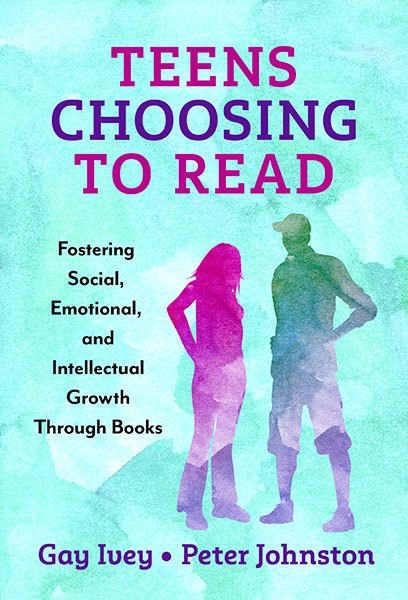Professors: Request an Exam Copy
Print copies available for US orders only. For orders outside the US, see our international distributors.
Publication Date: November 24, 2023
Pages: 208
Series: Language and Literacy Series

“Throughout the text (the authors) demonstrate that engaged reading leads to achievement, and students who succeed academically are more likely to live well-adjusted social, emotional, and moral lives.” —Teachers College Record
2023 Foreword INDIES Book of the Year Awards Finalist in Education
In a sea of troubling reports about education, teaching, reading, and the well-being of teens, Ivey and Johnston bring some good news that shows what happens when we stop underestimating young people.
This accessible book offers an engaging account of a 4-year study of adolescents who went from reluctant to enthusiastic readers. These youth reported that reading not only helped them manage their stress, but also helped them negotiate happier, more meaningful lives. This amazing transformation occurred when their teachers simply allowed them to select their own books, invited them to read with no strings attached, and provided time for them to do so. These students, nearly all of whom reported a previously negative relationship with reading, began to read voraciously inside and outside of school; performed better on state tests; and transformed their personal, relational, emotional, and moral lives in the process.
This illuminating book leads readers on a tour of adolescents’ reading lives in their own words, offering a long-overdue analysis of students’ deep engagement with literature. The text also includes research to inform arguments about what students should and should not read and the consequences of censoring books that interest them.
Book Features:
Gay Ivey is the William E. Moran Distinguished Professor in Literacy at the University of North Carolina Greensboro and a past president of the Literacy Research Association. Peter Johnston is professor emeritus of literacy teaching and learning at the University at Albany.
“Throughout the text (the authors) demonstrate that engaged reading leads to achievement, and students who succeed academically are more likely to live well-adjusted social, emotional, and moral lives.”
—Teachers College Record
“Finally, a book that connects adolescents’ academic skills to their developmental needs for agency, meaning-making, relationships, and family! The powerful message of Ivey and Johnston’s masterful book is simple, yet so very relevant and timely: When adolescents understand what their academic work is for, and leverage their scholarly activities to grow themselves as people, amazing things happen.”
—Mary Helen Immordino-Yang, Fahmy and Donna Attallah Chair in Humanistic Psychology, University of Southern California
“Too often curriculum designers and (some) teachers have been recalcitrant when it comes to reading in middle and high school, insisting on a canon of literature that all must read at the same pace. Gay Ivey and Peter Johnston bring together research, observation, and the voices of 8th-graders to show the undeniable impact of engaged reading, not just on students’ willingness to read and their increase in comprehension and analytical skills, but on class discussion and respect among students. Teens Choosing to Read simply must be read by all English teachers.”
—Penny Kittle, adjunct faculty, Plymouth State University
Contents (Tentative)
Acknowledgments
Part I. Engaging Reading, a Social Phenomenon
1. Young Adults Reading Literature (or Not)
Teens Can Be Enthusiastic, Engaged Readers
Engaging Books
The Subtleties of Supporting Teen Development
2. Choosing to Read
Good (Meaningful) Books
Disturbing Books
Autonomy
Talk About Books
3. Talk to Me—Cultivating Peer Relationships
Supportive Peer Relationships
Close Friendships
Learning Relationships
When Positive Relationships Are Absent
The Solution? Engaged Reading
4. Re-seeing Family
Families Reading
Families and Talk
Families, Minds, and Transformation
Disturbing Books and Difficult Topics
Parent Perspectives on Students’ Reading
Part II. The Breadth of Teen Development
5. Social-Emotional Development
The Social Hub of Development
Talking About Thoughts and Feelings
On Reflection
To Summarize
6. Who Will I Be? Building a Life Narrative
Living Into a Character
A Reflective Metaphor
Narrative as a Cautionary Tale
Synthesizing Principles
Self-Regulation
Reconstructing the Socialized Self
Who Am I? Who Do I Want to Be?
7. Moral Development
Developing the Moral Self
Moral Judgments
Recognizing Language as a Potential Act of Violence
Multiple Perspectives and Moral Reach
So . . .
8. Happiness, Wellbeing, and Other Trivial Matters
Gratefulness
Loss and Grief
More Healing Opportunities
Positive Emotions and Wellbeing
Feeling, Heard, Understood, and Cared For
Sources of Happiness and Wellbeing
9. Reading Competence
Reading Strategically
Reading Strategically, on Steroids
Comprehending Socially
Reading Closely
Reading: No Solo Act
Reading Competently
Part III. Negotiating Literature, Teaching, and Teen Development
10. What Do We Think We’re Doing?
Fizzling Out of Engagement
Unraveling of the Social Thread
More Teaching Changes
Knowing Books and Individuals
Negotiating Relationships and Relational Capital
11. Seamless Teaching
Seamlessness
Characters and Change
Inferring, Especially Thoughts and Feelings
Literature, Themes, and Life’s Dilemmas
Teaching About How Words Capture and Shape Thoughts and Feelings
Teaching for Intellectual Flexibility
12. Inquiry, Learning, and Authority
Foundations of Collaborative Dialogic Inquiry
Distributing Authority, Distributing Teaching
Teaching for Identity Shifts
Teaching: More Than the Sum of its Parts
13. Heckling
Concerns of Intellectuals, Philosophers, and the Like
Parents’ (and Thus Teachers’) Concerns
14. The Alchemy of Young Adults’ Engagements Among Books
Evidence
The Work of Conversations
The Work of ELA Teachers and Their Books
The Socialness of Reading
What Do We Want?
Appendix A The Study
Appendix B Young Adult Books and Other Trade Books Mentioned
Index
About the Author
2023 Foreword INDIES Book of the Year Awards Finalist in Education
Professors: Request an Exam Copy
Print copies available for US orders only. For orders outside the US, see our international distributors.